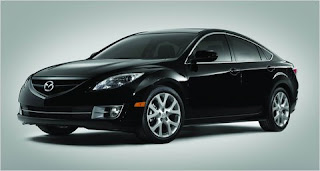Car Auto Online | Mazda | Mazda Motor Corporation is a Japanese car manufacturer based in Fuchū, Aki District, Hiroshima Prefecture, Japan. Mazda began as the Toyo Cork Kogyo Co., Ltd, founded in Japan in 1920. Toyo Cork Kogyo renamed itself to Toyo Kogyo Co., Ltd. in 1927. In 1931, Toyo Kogyo moved from manufacturing machine tools to vehicles, with the introduction of the MazdaGo, a three-wheeled open "truck" that resembled a motorcycle with an open wagon or truck bed. Toyo Kogyo produced weapons for the Japanese military throughout the Second World War, most notably the series 30 through 35 Type 99 rifle.
In 1960, the Mazda R360, a two-door, two-seat coupe which is Mazda's first real car, was introduced, followed by the Mazda engines in 1962. The company formally adopted the Mazda name in 1984, though every automobile sold from the beginning bore that name.
Mazda developed the Wankel rotary engine as a way of differentiating itself from other Japanese auto makers. Mazda experienced a decline after the 1973 fuel crisis, when customers abandoned rotary engines in favor of more fuel-efficient piston engines. In 1979, Ford Motor Company acquired a 27 percent financial stake in Toyo Kogyo and the two companies began to collaborate on a number of projects, particularly pick-up trucks and small cars. The company changed its name to Mazda Motor Corporation in 1984.
Beginning in the 1960s, Mazda put a major engineering effort into development of the Wankel rotary engine as a way of differentiating themselves from other Japanese auto companies. Beginning with the limited-production Cosmo Sport of 1967 and continuing to the present day with the RX-8, Mazda has become the sole manufacturer of Wankel-type engines mainly by way of attrition (NSU and Citroën both gave up on the design during the 1970s, and prototype Corvette efforts by General Motors never made it to production.).
This effort to bring attention to themselves apparently helped, as Mazda rapidly began to export its vehicles. Both piston-powered and rotary-powered models made their way around the world. The rotary models quickly became popular for their combination of good power and light weight when compared to piston-engined competitors that required heavier V6 or V8 engines to produce the same power. The R100 and the famed RX series (RX-2, RX-3, and RX-4) led the company's export efforts.
During 1968, Mazda started formal operations in Canada (Mazda Canada) although Mazdas were seen in Canada as early as 1959. In 1970, Mazda formally entered the American market (Mazda North American Operations) and was very successful there, going so far as to create the Mazda Rotary Pickup (based on the conventional piston-powered B-Series model) solely for North American buyers. To this day, Mazda remains the only automaker to have produced a Wankel-powered pickup truck.
Additionally, they are also the only marque to have ever offered a rotary-powered bus (the Mazda Parkway, offered only in Japan) or station wagon (within the RX-3 & RX-4 line for US markets).
Mazda's rotary success continued until the onset of the 1973 oil crisis. As American buyers (as well as those in other nations) quickly turned to vehicles with better fuel efficiency, the relatively thirsty rotary-powered models began to fall out of favor. Wisely, the company had not totally turned its back on piston engines, as they continued to produce a variety of four-cylinder models throughout the 1970s. The smaller Familia line in particular became very important to Mazda's worldwide sales after 1973, as did the somewhat larger Capella series.
Not wishing to abandon the rotary engine entirely, Mazda refocused their efforts and made it a choice for the sporting motorist rather than a mainstream powerplant. Starting with the lightweight RX-7 in 1978 and continuing with the modern RX-8, Mazda has continued its dedication to this unique powerplant. This switch in focus also resulted in the development of another lightweight sports car, the piston-powered Mazda Roadster (perhaps better known by its worldwide names as the MX-5 or Miata), inspired by the concept 'jinba ittai'. Introduced in 1989 to worldwide acclaim, the Roadster has been widely credited with reviving the concept of the small sports car after its decline in the late 1970s.
During 2007, Mazda produced almost 1.3 million vehicles for sale worldwide; The majority of these (+ 1 million) were produced in the company's Japanese plants, with the remainder coming from a variety of other plants worldwide.
Mazda has experienced substantial success in automobile racing with both its signature Wankel-engine cars and its piston-engine models. Mazda vehicles and engines compete in a wide variety of disciplines and series around the world. Mazda developed a hydrogen rotary engine and was the first company in the world to begin commercial leasing of a car that can run on hydrogen fuel. Like many automakers, Mazda is striving to increase recycling and to incorporate environmentally-friendly components made of bio-plastics and bio-fabrics.
Tags: mazda insurance, mazda car insurance, fairfax mazda, houston mazda, mazda wiki, mazda des moines, mazda dealers nj, mazda houston, mazda denver, mazda nj, oxmoor mazda, mazda phoenix, mazda extended warranty, mazda huntsville al, mazda cleveland


















